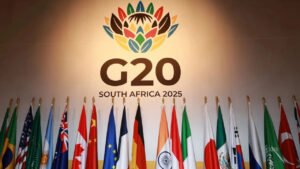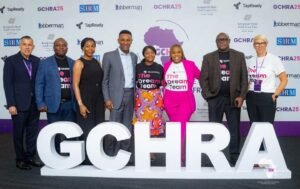Understanding the African Context
Africa’s workforce is expanding faster than any other region in the world. By 2030, the continent is expected to have the largest working-age population globally. This growth creates enormous opportunity, but it also puts pressure on HR systems that were never designed for such scale.
Many organizations still depend on manual or disconnected processes. Recruitment is tracked in spreadsheets, payroll is managed on separate systems, and employee data is stored across multiple platforms. Without integration, AI tools cannot function effectively because they rely on clean, connected data to generate insights.
Policy and regulation add another layer of complexity. What works in Nairobi may not apply in Lagos or Johannesburg. AI adoption must align with local labour laws, data privacy standards, and workplace cultures that vary significantly across African markets.
At GCHRA25, speakers like Dr. Najat El Mahdy and Andy Biladeau addressed these challenges directly. They urged HR leaders to start by assessing their organization’s readiness, building data literacy, defining ethical guidelines, and aligning AI tools with real business needs. Their message was simple: success depends on understanding where you are before deciding where to go.
This is exactly why platforms like GCHRA exist, to bridge the gap between global innovation and local realities, giving African HR professionals the context, tools, and community to lead transformation confidently.
Where AI Creates Real Value in African HR
AI in HR is not about replacing people. It is about giving professionals better tools to make smarter, faster, and fairer decisions. For African HR teams managing growth, compliance, and limited resources, the benefits are already clear.
Here is where forward-thinking HR leaders are seeing the biggest impact.
- Smarter Recruitment and Talent Matching
Hiring in Africa often means sorting through hundreds of applications for one role. AI-powered platforms can screen resumes, match candidates to job descriptions, and flag potential fits based on skills rather than titles or degrees.
This does not remove the need for recruiters. It frees them to focus on building relationships and assessing cultural fit. According to the Society for Human Resource Management (SHRM), AI can reduce time-to-hire by up to 40 percent while improving candidate quality when used correctly.
For companies expanding across the continent, these tools also open new talent pipelines in markets that are often overlooked.
- Performance and Learning Analytics
AI is transforming how organizations approach performance and learning. Instead of relying on annual reviews, HR teams can use AI to track progress in real time, identify skills gaps, and personalize training based on employee needs.
As shared on the GCHRA EduHub, more African HR leaders are investing in internal growth pipelines rather than relying solely on external hires. AI makes this practical by helping identify who needs development, what kind, and when.
- Payroll, Compliance, and Operations
Managing payroll and compliance across multiple African countries is challenging. AI helps automate calculations, monitor regulatory updates, and flag potential risks before they escalate.
For HR leaders overseeing cross-border teams, this means fewer administrative errors and more time for strategic work. Localized HR tech platforms are emerging that understand African markets and labor regulations, making implementation easier than ever.
- Employee Experience and Retention
Retention has always been a challenge in fast-growing African economies. AI tools can analyze employee engagement data, predict turnover risks, and highlight what drives satisfaction.
Chatbots and virtual HR assistants are also improving accessibility by offering instant answers in multiple languages and supporting employees across remote or hybrid environments. For organizations operating in different regions and time zones, this builds stronger, more responsive HR support.

Balancing Technology with Humanity
AI can be powerful, but it is not infallible. Algorithms can reflect bias, and automation can miss the context that only humans understand.
In African workplaces, where relationships, trust, and culture are central, technology must enhance empathy, not replace it. HR leaders must set clear ethical guardrails.
Before implementing AI, it is worth asking:
- Who reviews AI-generated HR decisions?
- How do we prevent bias in hiring or pay data?
- What decisions should always remain human?
According to Gartner, organizations that involve HR early in AI strategy are far more likely to adopt technology ethically and effectively. HR’s role is to ensure innovation never comes at the cost of fairness or transparency.
At GCHRA, this principle guides every discussion. The future of work in Africa must be built on trust, ethics, and human connection.
The Role of HR Leaders in Africa’s AI Transition
AI will not implement itself. HR leaders are the architects of this transformation. Their job is to align people, process, and policy in ways that make technology serve both business and humanity.
Here is what that looks like in practice:
- Build understanding first
HR professionals do not need to become data scientists, but they do need to understand how AI works. The GCHRA EduHub offers sessions specifically designed to help African HR practitioners develop AI literacy and confidence.
- Establish clear data governance
Work with IT, legal, and compliance teams to set policies on data collection, storage, and use. This includes complying with regulations like South Africa’s POPIA, Kenya’s Data Protection Act, and Nigeria’s NDPR. Transparency with employees builds trust and accountability.
- Start small and learn
Pilot AI tools in one HR area, such as recruitment or learning, and build from there. Measure what works, adjust, and scale responsibly.
- Collaborate across functions
AI adoption should not sit in HR alone. Partner with IT, finance, and operations to align on goals and risks. HR’s role is to keep the human perspective at the centre.
- Invest in people
Upskill HR teams alongside technology. Encourage continuous learning and make digital fluency part of your leadership culture.
At GCHRA26, these themes will return to the main stage through real-world case studies, panel discussions on generative AI, and hands-on workshops on building AI strategies for African contexts.
Moving Forward: Keeping People at the Center
AI is not replacing HR; it is redefining it. For African organizations, this moment offers a chance to leapfrog legacy systems and design people strategies that are smarter, fairer, and more agile.
The tools may be digital, but the mission remains human, creating workplaces where people can thrive, contribute, and grow.
Through GCHRA and the EduHub, African HR professionals are navigating this transformation together, sharing lessons, shaping policies, and ensuring technology serves people, not the other way around.
As Business Insider Africa reports, Africa’s digital transformation is unlocking new opportunities for HR innovation, but only for those willing to invest in both technology and people.
Explore more insights and keynotes from GCHRA on the EduHub.
Learn more about the Global Conference on Human Resources Africa and join the conversation.
The future of HR in Africa is being written now, and it is one where technology strengthens humanity, not replaces it.






